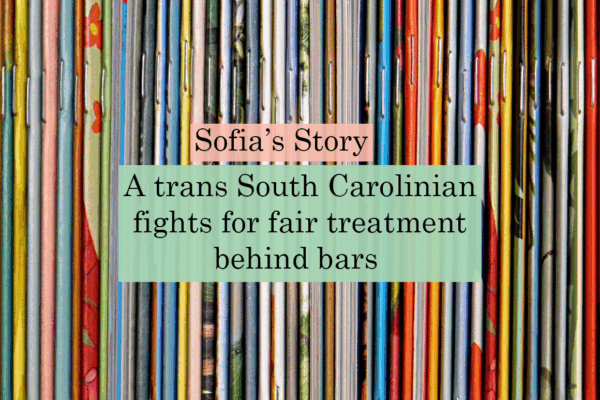Growing up, Sofia Cano never felt comfortable in her body. Even after she had a breakthrough and decided to live as her true self, she still had to struggle.
The state of South Carolina is rarely kind to its transgender residents, and Sofia finds herself in an especially hostile environment: in the custody of the South Carolina Department of Corrections.
Sofia is 22 years old, and for years, she has fought for medically necessary healthcare and accommodations. Since receiving a diagnosis of gender dysphoria, she has been denied hormone treatment, the ability to dress in accordance with her gender, and even the right to be called by her legal, female name.
In November 2022, the American Civil Liberties Union of South Carolina, Brooklyn Law School’s LGBTQ Advocacy Clinic, and Baker Botts L.L.P. filed a federal lawsuit against the South Carolina Department of Corrections (SCDC) and prison officials on Sofia’s behalf.
On January 30, 2024, the U.S. District Court for the District of South Carolina ruled that Sofia is likely to prevail in her lawsuit and SCDC must provide her with gender-affirming healthcare while the case is ongoing. However, SCDC’s doctor interviewed Sofia and, contrary to the opinions of two expert witnesses, reported that she does not need hormone therapy. The case is ongoing.
Denying medical care to incarcerated people is not only morally wrong — it is a violation of the Eighth Amendment’s constitutional protection against cruel and unusual punishment. In Sofia’s case, the State is also violating the Fourteenth Amendment right to equal protection, as well as federal statutes, including the Americans with Disabilities Act.
We would love to share Sofia’s story in her own words, because she is the best person to tell it. Unfortunately, the South Carolina Department of Corrections is enforcing a total ban on news media interviews with incarcerated people. To read more about our court battle to end this blatant violation of the First Amendment, see the case page for ACLU-SC v. Stirling.
Sofia’s story
Sofia is serving a 23-year sentence after a judge rendered a verdict of guilty but mentally ill on a voluntary manslaughter charge when she was 13 years old. She killed her mother, and she wishes every day that she could take back what she did.
During her time in prison, Sofia has had a lot of time to think about who she is, what she did, and how she plans to live her life when she is free again. She has expressed, again and again, profound remorse for her actions. She no longer recognizes the anger she felt in her early years.
Sofia didn’t always have the words to explain herself. She grew up in a conservative community in the South Carolina Upstate and did not know what it meant to be transgender. But by the time she was 16, she realized that she would never feel at home with the gender she was assigned at birth. For a time, she couldn’t look at herself in the mirror. She felt her body was betraying her, and as a result she fell into deep depression.
When she was 18, she began talking to mental health professionals in the Department of Corrections about her gender and the deep depression she felt. It took months of pleading with prison staff, but she finally received a diagnosis of gender dysphoria – clinically significant distress or discomfort when an individual’s gender identity does not reflect their sex assigned at birth.
The diagnosis made sense, but it didn’t bring relief. Sofia already knew who she was. Now she would have to make changes in her life.
Coming out, behind bars
When Sofia decided to come out as transgender, she only told a few close confidants at first. She was encouraged to find that they accepted her.
But when she started asking officials in the Department of Corrections to recognize her as a woman, she was met with indifference and seemingly endless delays.
Sofia has lived in custody since she was 13 years old. She is used to waiting and disappointment. But that doesn’t make it hurt any less when she has a diagnosis and the State is denying her the treatment. The physical and mental pain of gender dysphoria can be difficult to convey, but for years now it has felt like her body is working against her – and so is the State. She has repeatedly told Corrections officials that she experiences distress every day that she does not receive treatment.
The Court’s January 30 order provided a chance of relief. Although the odds were against her, Sofia allowed herself to feel some hope that a medical evaluation would lead to her finally receiving hormone therapy. She was disappointed that SCDC’s doctor denied her hormone therapy — despite expert analysis to the contrary – but she decided to keep fighting the case.
Sofia reads the news, and she is aware of South Carolina lawmakers’ efforts to strip away the rights and dignity of trans South Carolinians. House Bill 4624, which the governor signed in May, bans medically necessary healthcare for trans youth and bans the use of public funds “for gender transition procedures.” But the Constitution still applies to people held in prisons, and it still protects Sofia’s rights.
A journey of self-improvement
As she waits for relief, Sofia is working to improve herself and help the people around her. She completed her high school diploma when she was 16 years old and has taught GED classes inside her Corrections facility, leading the science and social studies classes. She has taught Spanish classes and gotten involved in the Pat Conroy Literary Club, reading books like Dune, Adventures of Huckleberry Finn, and The Hobbit. She worked for a time in the prison library, reading during the slow hours when nobody came in to check out a book.
After excelling in science, technology, engineering, and math earlier in her academic career, Sofia turned her attention to the social sciences. She is pursuing a bachelor’s degree in sociology via a self-paced correspondence course offered by Colorado State University Pueblo, which sends her assignments in the mail. It’s slow going and hard to stay on track because she has no classmates or professors around her, but she is currently halfway through her degree program.
She tries to be social, but she sticks to people she knows she can trust. She serves as game master for a group of fellow inmates who play the tabletop role-playing game Pathfinder.
Sofia doesn’t want to be seen as brave. She doesn’t feel stronger than anyone else. She only wants human dignity, and she sees no choice but to fight for it.
We’re proud to fight alongside her. To read more about Sofia’s case, visit our case page for Cano v. S.C. Department of Corrections. To read more about our fight to publish Sofia’s story in her own words, visit the case page for ACLU-SC v. Stirling.



